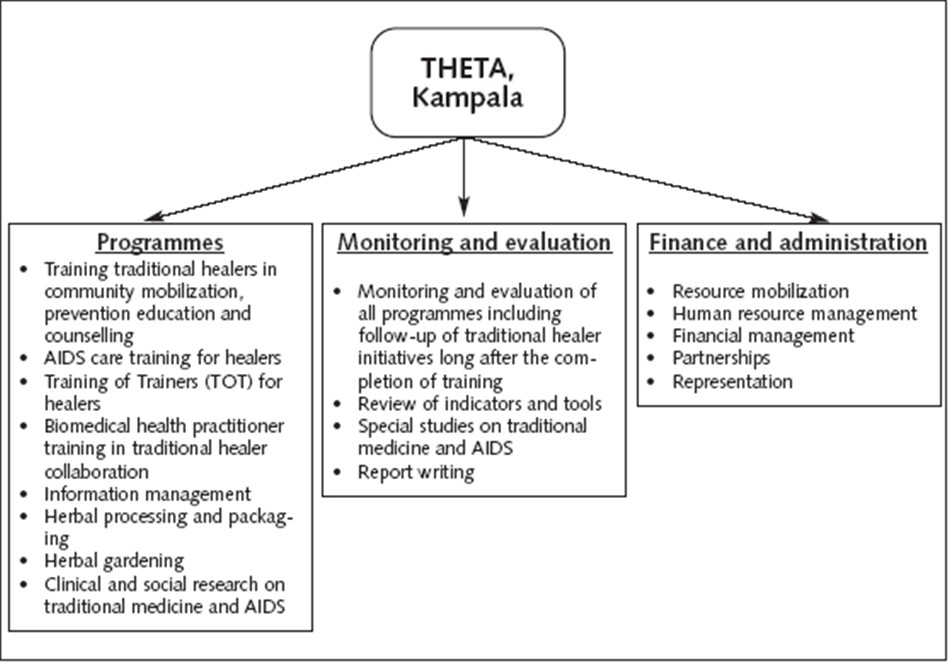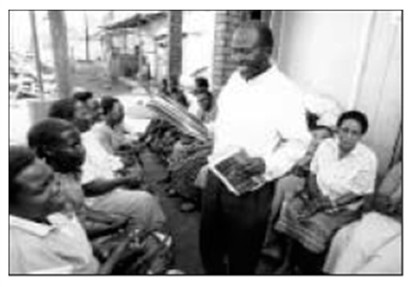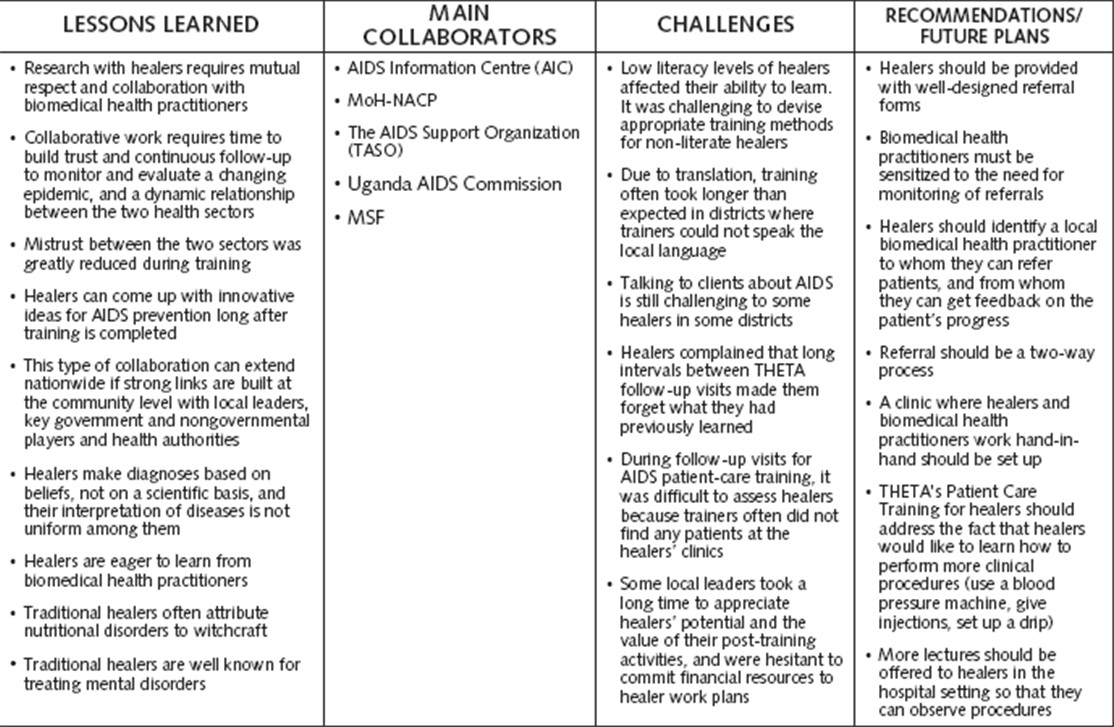|
|  |
| THETA Counseling |

|
Ancient Remedies, New Disease: Involving traditional healers in increasing access to AIDS care and prevention
History of Traditional Medicine
Long before conventional medicine, traditional healing practices in Africa existed. Attempts by colonial governments and early religious missionaries to suppress it did not succeed. Traditional medicine not only offers the possibility of cures, but it also provides a national heritage and a means of linking the land and its people. In sub-Saharan Africa today, traditional healers far outnumber modern health practitioners, and the majority of the population uses traditional medicine. WHO estimates that 80% of people in lowand middle-income countries rely primarily on traditional medicine for their primary health-care needs. Although the actual number of traditional healers is unknown in most countries, such healers constitute a significantly large group of practitioners who are recognized, trusted and respected by their respective communities.
Traditional and Modern Health Practitioners Together Against AIDS (THETA): Objectives and Activities
At the peak of HIV prevalence in Uganda in 1992, this emergency sparked a flood of new ideas in response, including the founding of THETA. With the support of the National AIDS Control Programme and the Uganda AIDS Commission, together with The AIDS Support Organisation (TASO) and Médecins Sans Frontières (MSF), THETAs work started in 1992 with two pilot projects based in Kampala. The first project aimed at evaluating traditional herbal treatments for some specific AIDS symptoms. The second project tested the effect of empowering traditional healers as STI/AIDS educators and counselors through training.
The THETA training programme has shown that traditional healers can be enthusiastic and effective community educators and counselors for STI/AIDS through their ability to deliver preventive messages in unique ways, such as the use of personal testimonies, stories, song, dance, drama and proverbs. THETAs success story attracted the attention of UNAIDS and, in February 2000, it was asked to host a regional meeting to discuss traditional medicine and HIV/AIDS in Eastern and Southern Africa. At this meeting, where 17 countries were represented, THETA was chosen as the Regional Secretariat of a Task Force aimed at developing collaboration between the traditional and modern health sectors for HIV/AIDS prevention, care and research in Eastern and Southern Africa. The mandate of this Task Force is to share information, advice and experience, to network, and to document best practices around traditional medicine and AIDS.
THETAs main goal is to improve and expand access to HIV/AIDS prevention, education and care for disadvantaged populations, such as women and children, through mobilization and the training of traditional healers in Uganda. The specific objectives are:
 |
 |
|
The outcomes of traditional healer training in AIDS care, education and counseling by THETA have added to the group of fighters against AIDS. Before THETA initiated activities in the districts, healers reported that they were doing little or nothing regarding AIDS and that they did not see AIDS patients. Healers were often known for their witchcraft and rarely cooperated with each other or the biomedical health services. By June 2000, 1503 people had been reached by traditional healers in community education events in one THETA outreach district. Traditional healers who have learned about the benefits of AIDS counseling, have quickly integrated their new skills into their old practices. In all the THETA districts, traditional healers have appreciated learning about AIDS counseling and are applying it in helping to diagnose patients problems, as well as supporting clients in prevention of HIV and care for PLWHA and their family members.

|
 |
|
 |
|
 |
|
|
|
According to THETA programme leaders, it is important to remember that the following key elements act in synergy with each other. However, none of these elements alone would be enough to ensure the success of the programme.
- Respect for healers as legitimate health-care providers generates trust. Healers have a long history of not being respected by colonial governments, missionaries and the biomedical health-care system. When THETA approached them with a genuine respect for their profession and their work, the relationship started off on a positive note. THETA also relates to healers with openness, and tries to convince others of the value of traditional healers, which instills increased self-confidence among healers.
- Involvement of community leaders in the implementation and follow-up of training activities. Including community leaders from the moment THETA begins its activities in outreach districts has allowed for a community ownership, interest in sustainability, and increased collaboration at all levels.
- Integration of biomedical health workers in the training programme allows for a relationship to be built between traditional healers and biomedical health practitioners for future collaboration, including cross-referrals. As biomedical health practitioners from THETA and local health facilities take part in the programme and are targeted in the same way as healers, the latter are able to build a relationship with them and trust them enough to refer patients, consult on medical issues and continue an open dialogue.
- The length of the intervention allows THETA and healers not only to build a trusting relationship but to strengthen each others capacity and sustainability, while cultivating a genuine interest in each other. At the outset, four years can seem like a long time, but the intensive training only takes place during the first six months. The remaining time spent on follow-up is important to reinforce concepts and to learn from traditional healer initiatives that sometimes only start long after training is completed.
- A strong monitoring and evaluation component throughout implementation and follow-up has allowed THETA to keep track of what is going well and what needs improvement, and to identify determinants of success and failure. It has also allowed for reflection on its aims, goals and vision for future planning.
(King et al 2002)
| THETA Summary Chart |

|
|
|
|  |

